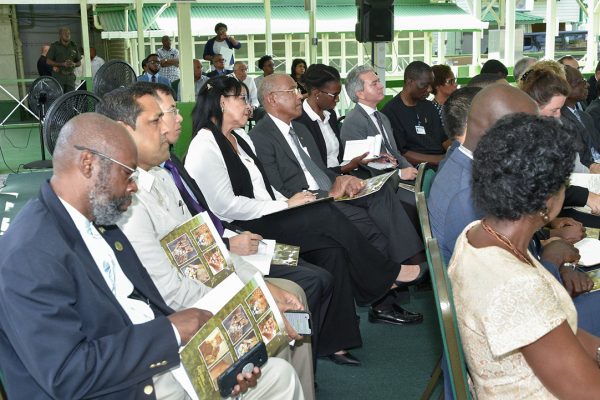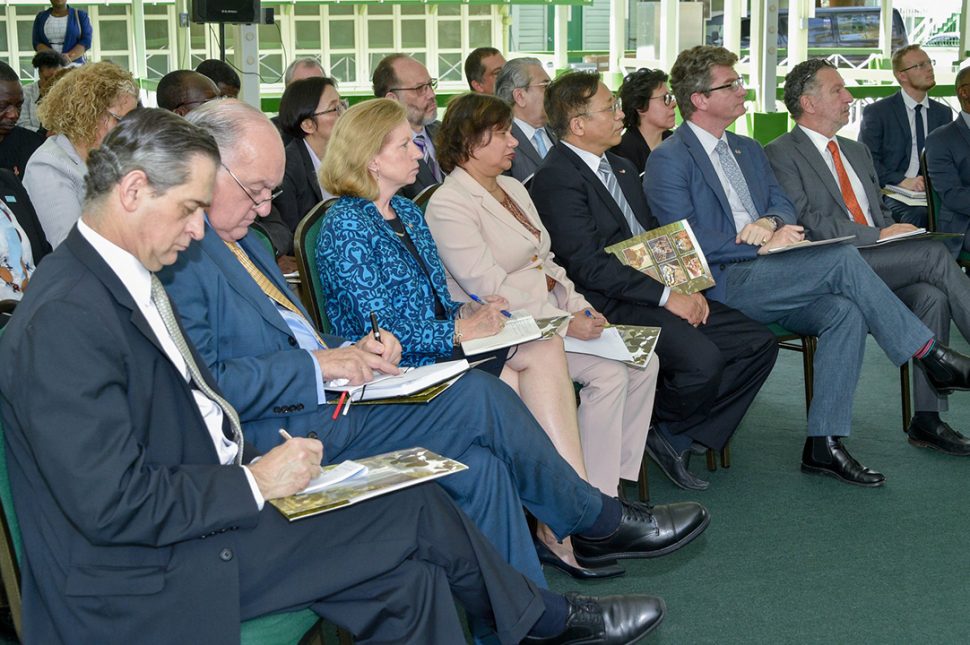President David Granger yesterday maintained that he has a role in identifying nominees for chairmanship of GECOM and in a sign of the international dimension to the current political stalemate he said that he had made the government’s case twice by phone to the Commonwealth Secretary General.
The President met in the morning with the diplomatic community and in the afternoon with Civil society and told both groups that the Government of Guyana is committed to upholding the Constitution; respecting the institutions of the State – including the National Assembly and the Courts; ensuring the rule of law; safeguarding human and civil rights; and preserving democracy especially through the conduct of free, fair and credible Local as well as General and Regional Elections.
Since the June 18 ruling of the Caribbean Court of Justice (CCJ) there have been increasing calls for the President and Cabinet to resign in keeping with the provisions of Article 106(6) and name a date for elections in keeping with Article 106 (7).

Granger revealed yesterday that he has been required to present his government’s case to the Caribbean Community (CARICOM) once since the ruling and twice to the Commonwealth Secretary General, Baroness Patricia Scotland.
Guyana which is currently one of the eight members of the Commonwealth Ministerial Action Group on the Harare Declaration (CMAG) could be at risk of sanctions including suspension from the Commonwealth of Nations, if it is found that government is engaged in the “unjustified postponement of elections” or the “undermining of the judiciary.”
Granger took pains to dispel any such concerns arguing that recent political developments have been subject to some misinterpretation and misrepresentation of Government’s intentions.
“We have upheld the Constitution…the legal processes which we initiated were neither frivolous nor calculated to delay the consequences of the no-confidence vote,” he stressed.
According to Granger since the CCJ ruling on the appointment of a chair of the Guyana Elections Commission (GECOM) his government has acted in good faith.
“I met twice with the Leader of the Opposition since the CCJ issued its rulings… The teams identified by the Government and Opposition to continue the process of identifying nominees for the position of Chairman of the Elections Commission met four times,” he noted before reiterating his claim that the ruling granted him a role in identifying persons for consideration as Chairman.
“In other words, the President is not a passive bystander to the process. He is an active participant in ‘hammering out’ the list of persons ‘not unacceptable’ to him,” he told Civil Society but not the Diplomatic community, according to the text of the presentations released by the Ministry of the Presidency.
Due to his belief in his “active role” the President argued that he had the reasonable expectation that the Government’s recommendations for the GECOM Chairman would have been accorded serious consideration during the consensual process.
Spurious
“I have advised the Leader of the Opposition that any list emerging out of a process which does not accord serious consideration to the Government’s recommendations, in the spirit of the CCJ ruling, would be spurious and that I would have great difficulty in accepting such a list,” he stressed.
So far four names have been found “not unacceptable” to the President. Two names he submitted for consideration, retired Justice Claudette La Bennett and Attorney at Law Kesaundra Alves have been discarded and an additional four names which had been submitted to him by Opposition Leader Bharrat Jagdeo are currently awaiting a response.
In responding to these claims the Opposition has accused Granger of using the ruling of the CCJ selectively to ascribe to himself a role that seemingly goes beyond what the Constitution of Guyana envisages.
In a press statement last evening the PPP argued that the President “selectively quotes from paragraph 28 of the CCJ’s June 18, 2019 ruling.”
“While, Mr. Granger quotes the CCJ as saying that “This approach gives the President a role in the identification of the six names” – in fact, he ignored that this paragraphs deals with him being prevented from making a unilateral appointment,” the statement contended.
The paragraph in question reads: “Once the President and the Leader of the Opposition have hammered out a list of names not unacceptable to the President, the list, comprising the six persons, must then formally be submitted to the President by the Leader of the Opposition and the President must then select the Chairman from among those names. This approach gives the President a role in the identification of the six names, but it obviates the possibility that, after the formal presentation of the list, the President could suggest that one or more of the names, or indeed the entire list, is ‘unacceptable’. Unilateral appointment by the President in keeping with the proviso to Article 161(2) can hardly be an option if the Leader of the Opposition demonstrates a willingness to engage in good faith the process outlined above.”
The party further argued yesterday that Granger clearly refused to even address the orders of the CCJ, in the matter of appointing a new GECOM Chairperson stressing that the court ruled that “It is now a matter of the greatest public importance that the President and the Leader of the Opposition should, as soon as possible, embark upon and conclude the process of appointing a new GECOM Chairman.”
“This imperative is now of the utmost urgency in light of our decision in the no confidence motion cases that the motion was validly passed thereby triggering the need for fresh general elections,” the ruling further explains.
Noting that Granger, on July 4, 2019, accepted that he cannot nominate names to himself for approval the party said it found it strange that the President now seems to be attempting to define “serious consideration” of his latitude to suggest names of nominees for the post of GECOM Chair to mean acceptance by the Leader of the Opposition of his suggestions.
The statement also criticized the President’s position that House-to-House registration was necessary to create a “credible Official List of Electors” before General and Regional Elections.
Granger had argued that the existing Official List of Electors falls short of acceptable standards and cannot guarantee free, fair and credible elections so a new List needs to be constituted and it has been recommended that this should be done through a process of ‘house-to-house’ registration.
He reminded that GECOM in 2018, had requested funding for its planned ‘house-to-house’ registration upon the expiration of the existing ‘List’ the validity of which came to an end on April 30.
“ The National Assembly approved prior to the expiration of the list a sum of $5.371 B in November 2018, and subsequent to the vote of no-confidence approved an additional $3.482 B this year. So, in all, the Elections Commission has been provided with over G$8.8B…. Government has not been dilatory in providing funds for the Elections Commission to do its work,” the President said.
However the opposition has drawn attention to statements by Chief Election Officer (CEO) Keith Lowenfield that claims of a “bloated” Voters’ List are speculative.
Lowenfield has also maintained that the last valid List of Voters can be updated via a Claims and Objections process.
Opposition Leader Jagdeo has also provided reporters with a copy of a Mission Report from a United Nations Needs Assessment team which argued that “there is no certainty that a new voters’ list will have more credibility than the current list and that stakeholders will trust it more.”
“Furthermore any list created close to election will likely be criticized as politically motivated,” the report concluded.
Additionally, a work plan made public by Jagdeo shows that when it applied for funds to conduct House to House to House, GECOM intended to spend 10 months, March to December, completing the process.
“The Constitution is clear that elections are due in three months. The CCJ is clear that GECOM must comply with the Constitution…Article 106 of the Constitution invests in the President and the National Assembly (and implicitly in GECOM), responsibilities that impact on the precise timing of the elections which must be held,” the opposition concluded.





